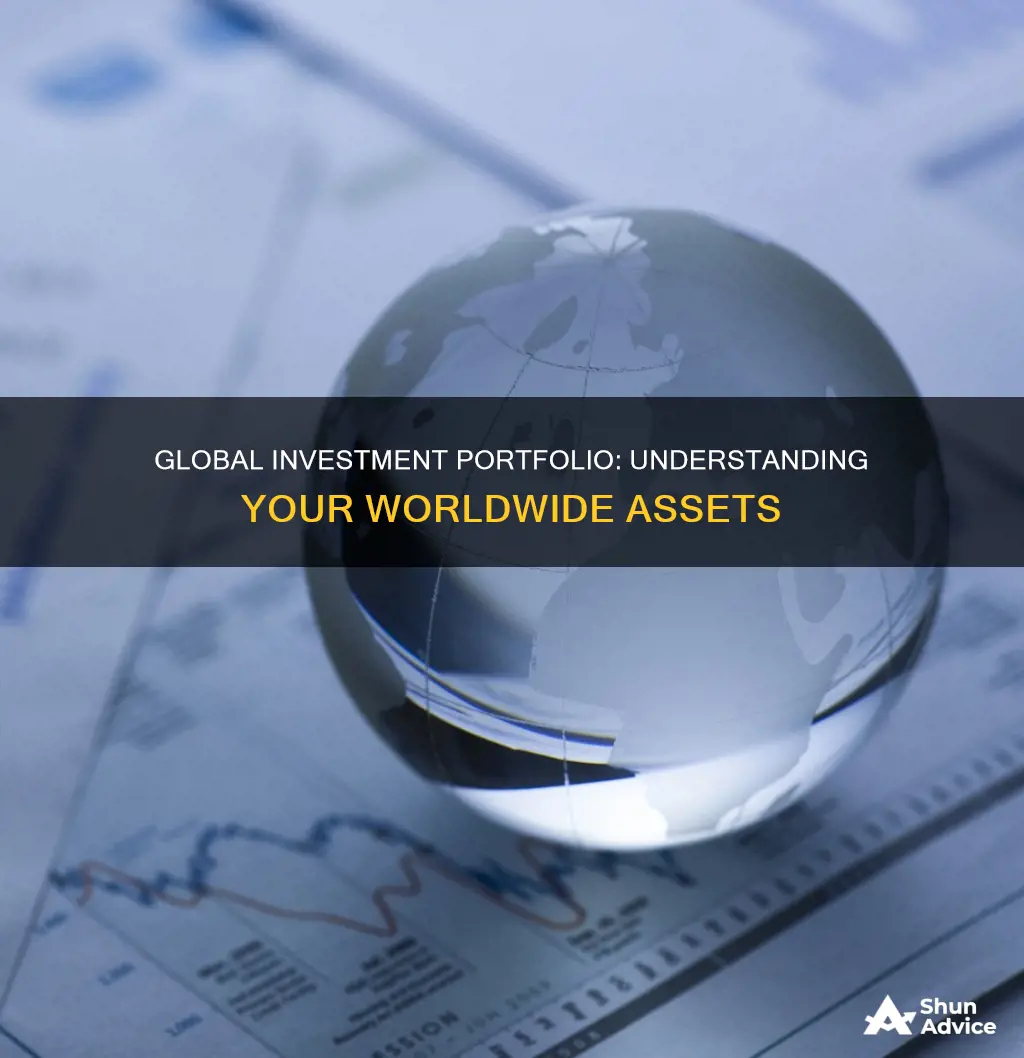
Global investment portfolios, also known as international or foreign portfolios, are an increasingly popular strategy for investors. They involve selecting assets from international markets, rather than limiting investments to a single domestic geography. This approach offers greater diversification, reducing the risk of exposure to only one market, and allowing investors to access liquidity across multiple jurisdictions. Global portfolios can also provide investors with a broader range of investment options and help to manage risk. However, it is important to note that global investment portfolios come with their own set of challenges, such as currency fluctuations, political instability, and higher transaction costs.
| Characteristics | Values |
|---|---|
| Definition | Global portfolio management involves selecting assets that are spread across international markets. |
| Type of Assets | Equity and debt securities |
| Benefits | Greater diversification within the portfolio, reduced risk of only being exposed to one market, access to liquidity across multiple jurisdictions, broader investment reach and return |
| Risks | Fluctuations in currency exchange rates, changes in market value, changes in foreign interest rates, significant political, economic, and social events, less access to important information, varying market operations and procedures |
| Investor Profile | Investors who want to diversify their assets by moving away from a domestic-only portfolio |
What You'll Learn

International investing involves selecting global investment instruments
There are several options for international investing, including:
- Government debt: Global governments issue debt in the form of notes and bonds with varying maturities and interest rates. Countries can be classified as developed, emerging, or frontier markets, each carrying different levels of risk and return potential.
- International equity indexes: For comprehensive global market exposure, investors can consider world index funds that include stocks from countries across the globe, such as the FTSE Global All Cap Index or the Vanguard Total World Stock Index Fund.
- Share purchase of a foreign company: Investors can directly purchase shares of companies based in other countries, gaining exposure to foreign markets and diversifying their portfolios.
- Buying foreign government-issued bonds: Bonds typically have medium to long-term investment horizons and can provide income, growth potential, or a combination of both.
- Acquiring assets in a foreign firm: This can include investing in a foreign company's physical assets, such as property or equipment.
It is important to note that international investing comes with unique risks. These include changes in exchange rates, foreign interest rates, geopolitical events, and varying market operations and procedures. Additionally, investors may have less access to important information due to cross-cultural differences and jurisdictional barriers.
Savings Accounts: Invest or Save?
You may want to see also

Foreign portfolio investments
Foreign portfolio investment (FPI) is a type of foreign investment, which involves capital flowing from one country to another, giving foreigners an ownership interest in a business outside of their home country. Foreign portfolio investment specifically refers to the purchase of securities and other financial assets from another country. This includes stocks, bonds, mutual funds, exchange-traded funds, American depositary receipts (ADRs), and global depositary receipts (GDRs).
FPI is a passive form of investment, meaning that investors do not actively manage the investments or the companies that issue the assets. This also means that investors do not have direct control over the businesses they invest in. FPI is therefore considered a short-term investment strategy, as investors can quickly sell off their assets. The ease of selling FPI assets is due to their high liquidity, which is a result of the ease with which the securities are traded.
FPI is one of the most common ways for investors to participate in an overseas economy, especially for retail investors. It is a way for investors to diversify their portfolios with an international advantage. FPI is also more accessible for the average investor than foreign direct investment (FDI) because it requires much less investment capital and research.
Some benefits of FPI include portfolio diversification, access to international credit, and benefits from exchange rates.
Investments vs Savings: Liquidity and Financial Planning
You may want to see also

Global portfolio management
One of the key benefits of global portfolio management is the potential for greater diversification. By investing in multiple countries and markets, investors can reduce the impact of market cycles and economic downturns in any single market. For instance, if US stocks underperform, gains in international holdings can offset those losses. Additionally, investing in multiple currencies can help neutralize currency fluctuations.
However, global portfolio management also comes with certain challenges and risks. Investors need to have a deep understanding of the markets they are investing in, including the financial factors, tax rates, interest rates, and currency values. Political and economic instability in some countries can introduce additional risks, and transaction costs may be higher when investing internationally.
Understanding Your Investment Portfolio Report: A Guide
You may want to see also

Risks of global portfolio management
Global portfolio management involves selecting assets that are spread across international markets. This strategy provides greater diversification within the portfolio, reduces the risk of only being exposed to one market, and allows investors to access liquidity across multiple jurisdictions.
However, there are several risks associated with global portfolio management:
Political and Economic Risk
Many developing countries do not have the same level of political and economic stability as more developed nations like the United States. Political instability, such as a coup, can cause significant declines in a country's stock market. Economic instability can also impact the performance of investments. For example, a country's stock market may be affected by high inflation or a financial crisis.
Currency Exchange Rate Risk
Currency exchange rates fluctuate, and these changes can affect the value of investments. If the currency of a foreign market slips in value against a domestic currency, such as the US dollar, it can negatively impact the returns on investments.
Increased Transaction Costs
Global portfolio management often involves higher transaction costs, including commission and brokerage charges, when buying and selling international stocks. Additionally, there may be taxes, stamp duties, levies, and exchange fees associated with international investments, which can dilute overall returns.
Unfavourable Exchange Rate Movement
Investors are exposed to the risk of exchange rate changes in foreign countries, which are beyond their control. These changes can significantly impact the total value of foreign portfolios and the earnings from investments. A weakening of the local currency can reduce the value of securities.
Frictions in the International Financial Market
Market frictions in foreign economies may arise due to governmental control, changing tax laws, and explicit or implicit transaction costs. Governments actively seek to control international financial flows through various mechanisms, including taxes on foreign direct investment (FDI) and restrictions on the outflow of funds.
Manipulation of Security Prices
Security prices can be influenced by governments and powerful brokers. Governments, in particular, can heavily influence prices through monetary and fiscal policy changes. Public sector institutions and banks also hold a substantial share of securities traded on stock exchanges, allowing them to impact prices.
Unequal Access to Information
Cross-cultural differences and varying levels of transparency can create barriers to information access for international investors. This challenge may make it difficult for investors to act rationally and make prudent decisions.
While global portfolio management offers the advantage of broader investment opportunities and increased diversification, investors should carefully consider and mitigate the risks outlined above to protect their investments and financial goals.
Public Saving and Investment: Two Sides of the Same Coin?
You may want to see also

Benefits of global portfolio management
A global investment portfolio, also known as an international or foreign portfolio, involves selecting assets from international markets, rather than focusing on a single domestic market. This type of portfolio management provides a range of benefits, including:
Diversification
One of the key advantages of global portfolio management is the level of diversification it offers. By investing in international markets, investors can reduce the risk of concentrating their assets in a single market or sector. This diversification allows investors to access a wider range of opportunities and protect themselves from events that may affect specific areas of the market. For example, an investor with a global portfolio can gain exposure to different categories of stocks, such as those in the technology or consumer discretionary sectors, which may outperform other areas at different times.
Risk Management
Global portfolios can also help manage risk by reducing exposure to a single market's volatility. If an investor's domestic market underperforms, gains in international holdings can offset those losses. Additionally, global portfolios allow investors to take advantage of market cycles in different nations. For instance, if an investor believes that the US market is overvalued, they can explore investment opportunities in developing regions with strong potential, such as Latin America or Asia.
Access to Liquidity
Global portfolio management provides access to liquidity across multiple jurisdictions. This means investors can more easily buy and sell assets in international markets, providing flexibility and potentially faster access to funds.
Broader Investment Reach and Returns
By investing globally, individuals can broaden their investment reach and target higher returns. Global markets offer a wider range of investment opportunities, allowing investors to seek out the most promising economies and sectors.
Long-Term Stability
Global portfolio management is particularly beneficial for long-term investment strategies. Over time, investing in a variety of markets and sectors can reduce overall portfolio volatility. This stability can lead to better sleep at night and help investors avoid emotional, short-term decisions that may hinder their long-term financial goals.
Building a Wine Investment Portfolio: A Beginner's Guide
You may want to see also
Frequently asked questions
A global investment portfolio, also known as an international portfolio, is a selection of stocks and other assets from international markets, rather than domestic ones.
Global investment portfolios offer greater diversification, reducing the risk of only being exposed to one market. They also allow investors to access liquidity across multiple jurisdictions and can enhance returns.
Owning foreign assets exposes investors to unique risks such as fluctuations in exchange rates, foreign interest rates, and geopolitical events. Other risks include unequal access to information, manipulation of security prices, and frictions in the international financial market.







